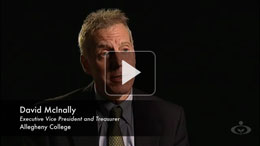Earlier this week I had the pleasure of attending an excellent event co-hosted by Citi and EDF on Innovations in Energy Efficiency Finance. As you can see from the agenda below, it was a fully-packed day with an all-star cast of panelists diving deep into the barriers and solutions to financing energy efficiency projects.
Upfront it was acknowledged that huge potential exist from energy efficiency. As this EDF blog post recently noted:“Using data from a 2009 McKinsey study, EDF estimates that there are at least $40 billion of investment opportunities for EE projects in commercial buildings that will provide annual returns in excess of 20%.”
Panelists said financing was the biggest barrier to energy efficiency. This is the same message we hear consistently from colleges and universities, which has led us to create the ACUPCC Financing Committee, and financing webpage on the topic.
Read more




